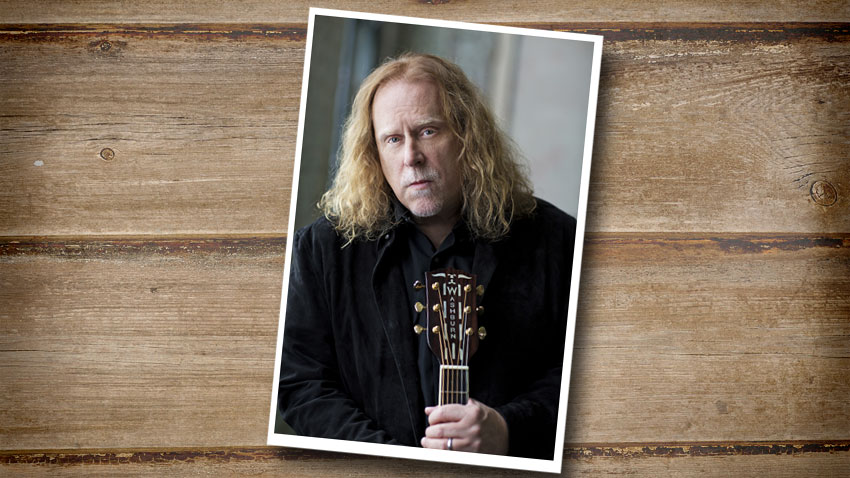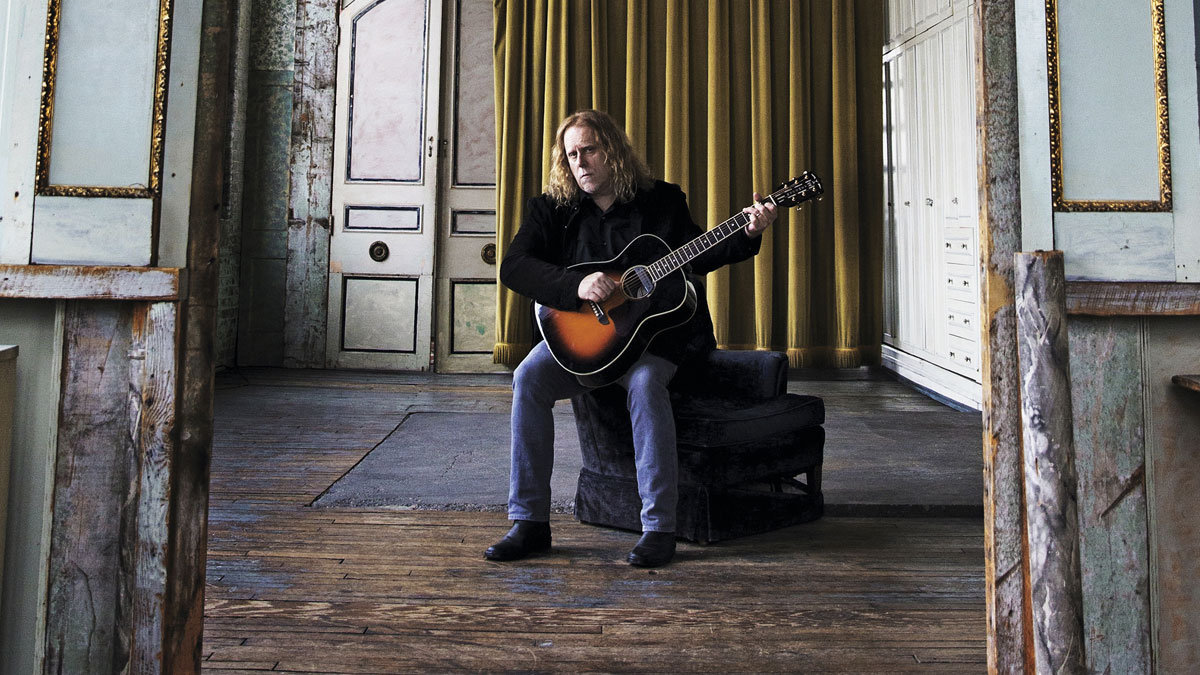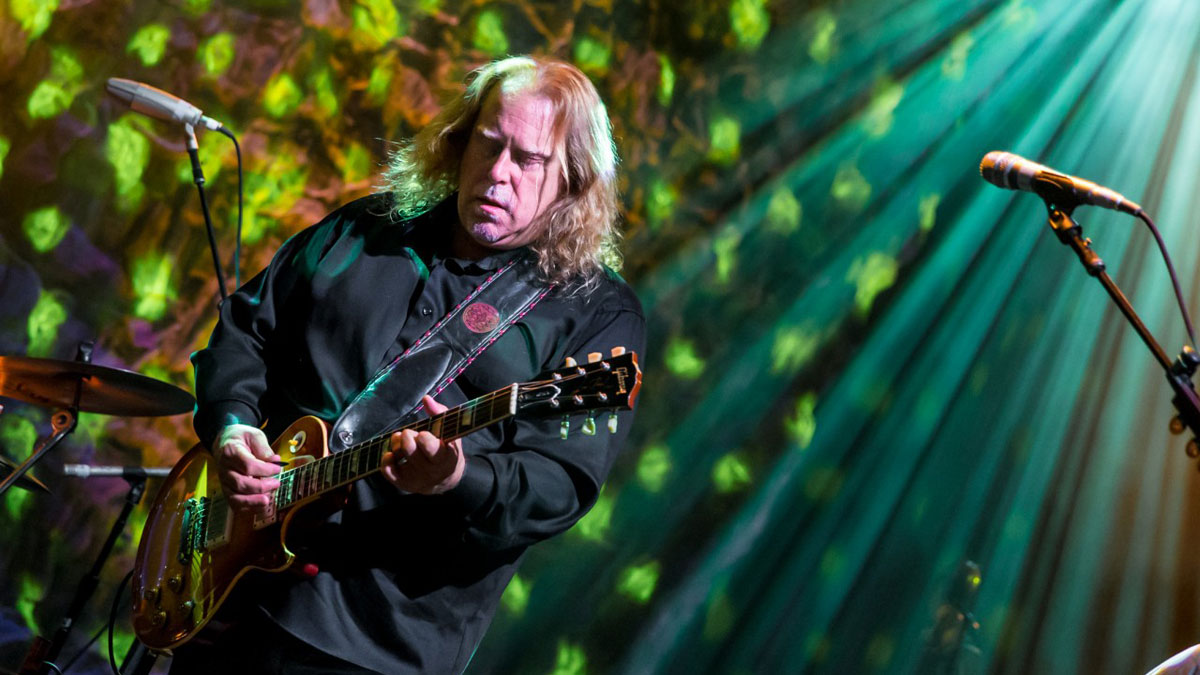Warren Haynes's top 12 tips for guitarists
Advice from the Gov't Mule man and slide whiz

Introduction
Southern master Warren Haynes tells us about jumping genres, duelling with Derek Trucks, and what it really takes to ride with The Allman Brothers…
Warren Haynes can give us an hour. Rehearsals are booked. The band are on standby. In short, it’s another busy day for the famously prolific Southerner, who has barely stopped since he burst onto the 80s circuit with a head full of genres and a hunger to make his mark. “As an artist,” he tells us, “I’ve always been someone who could never be happy doing the same thing all the time.”
Perhaps that helps explain Haynes’ lightfooted career. To discount the dizzying array of guest-spots and stopovers, the 55-year-old guitarist has lent his soulful firepower to two seminal American bands, in The Allman Brothers and the remnants of The Grateful Dead. Since 1994, he’s led a third, Gov’t Mule, from jam-band roots through forays into jazz, reggae and prog-rock.
In snatched moments, Haynes has even found time for a solo career, with 2015’s Ashes & Dust airing 13 tracks of acoustic-led Americana backed by the New Jersey folk collective, Railroad Earth. No wonder that an hour in this man’s company throws up plenty of wisdom.
1. Borrow From The Best
I loved Jeff Beck, Peter Green, Billy Gibbons and Steve Howe, who is one of the most unique players I’ve ever heard
“I really stole from everybody, and I think if you’re gonna be serious about it, you should check out the best in every genre. The more music you hear, the better chance you’re gonna have of finding your own voice. My first three guitar heroes were Eric Clapton, Jimi Hendrix and Johnny Winter, and that paved the way for me to discover everything else from that era.
“I loved Jeff Beck, Peter Green, Billy Gibbons and Steve Howe, who is one of the most unique players I’ve ever heard. You have to find what moves you. It doesn’t have to be impressive to be great. Some of the most amazing guitar playing is not meant to impress, but it’s just beautiful.”
2. Burn The Midnight Oil
“There were certain songs on Ashes & Dust that I wanted to record around midnight. I didn’t want us to be too cerebral in our approach. I wanted it to be a stream of consciousness, to get that late-night feeling when you have less of a filter about the way you play.
“The first song was Hallelujah Boulevard, which has that ethereal intro where you don’t really know what’s coming. Right before the first take, I said into the microphone, ‘Just think Astral Weeks,’ referring to the Van Morrison record, which was done in a day-and-a-half. We’d do three takes - I like to do things in threes - then we wouldn’t even listen back. We’d come back the next day and see what had happened.”
3. Make Your Own Name
Being elevated to a higher status when I joined The Allman Brothers really put pressure on me to figure out who I was
“To play guitar in The Allman Brothers, there’s the obvious stuff, like having the chops to do it, but it’s also having your own voice. When I joined in ’89, they were adamant that I needed to be myself, and not feel like I had to play more like Duane Allman.
“Of course, he was such a big influence that it comes out in me anyway. At the same time, I always felt like there was this friendly challenge to be myself. That was one of the things that pushed me.
“Being elevated to a higher status when I joined The Allman Brothers really put pressure on me to figure out who I was. It’s been an extremely important part of my quest to find my own voice. That’s what I’ve strived for my entire life.”
Don't Miss
5 minutes alone: Warren Haynes
Warren Haynes talks Allman Brothers, John Scofield and new Gov't Mule releases

The Blues Ain't 'Easy'
4. The Blues Ain’t ‘Easy’
“Maybe it’s easy to play the chord structure, the notes and scales. But to play blues the way the masters play it is one of the most unique arts. When you hear Albert King, BB King, Freddie King, Otis Rush, Son House and Howlin’ Wolf play the blues - that’s the top of the heap. There’s such a difference between mediocre blues and great blues. When you hear great blues, it’s the most moving thing on Earth.”
5. Bluesmen Improve With Age
It’s when you go way back - when I was 21 or something - that’s when you start cringing. Like, ‘Why are you in such a hurry? Slow down…!’
“I was 34 when we made the first Gov’t Mule record, so I was already a fairly seasoned player, but when I listen back, it sounds like I’m still finding myself.
“I feel like you can hear my playing change for the better over the next 20 years. But I still have good feelings when I hear those early records. It’s when you go way back - when I was 21 or something - that’s when you start cringing. Like, ‘Why are you in such a hurry? Slow down…!’”
6. Find The Right Guitar
“[Gibsons] have just always worked better for me. I think my voice sounds better with a Gibson. The Les Paul is my favourite, but I also love the 335 and the Firebird.
“My former guitar tech, Brian Farmer, who passed away a year ago, was responsible for all the nicknames of my guitars [such as the ‘Sex Machine’ Les Paul and ‘Freeway’ Firebird]. He just did it so he could tell them apart in the dark. I remember Pete Townshend having numbers. So it was an interesting and fun concept.”
7. Play For The Song
Somewhere along the way, we’ve built this audience that is not just tolerant of improvisation but very encouraging of that
“I’m more of an electric player, but these songs on Ashes & Dust were all written on acoustic guitar. What happened a lot of the time was that Andy [Goessling] from Railroad Earth handled the acoustic, and I was thinking, ‘How can I weave myself into these songs?’ I didn’t go into the sessions realising how much slide I’d end up playing, but it seemed to fit with so much of the material that I got excited and started playing more and more.”
8. Wing It
“In a live performance, I think there needs to be a balance between the structured songs and the improvised songs that change drastically, night by night. I try to incorporate that philosophy into the studio as well. It’s a nice yin-yang sorta thing.
“Somewhere along the way, we’ve built this audience that is not just tolerant of improvisation but very encouraging of that. If we were playing for the Eagles’ audience or Elton John’s audience, it would be much more nerve-wracking, because they’re listening for a repeat of the original recording. But what we do, for the most part, the audience is very embracing of the possibility of mistakes. And in some cases, they prefer it.”

Shake Up Your Sound
9. Shake Up Your Sound
“For Ashes & Dust, I wanted a sound that blended in with the acoustic instruments and didn’t seem too odd of a match.
“A sound that let me be myself, but also pushed me to play a little differently. The slide guitar is all played on a Les Paul, usually my signature model. All the jazzy, hollowbody-sounding stuff is a D’Angelico New Yorker [reissue], and I have a 1961 Gibson ES-335 that I played on songs like Wanderlust.
People that love to collaborate tend to be good collaborators. People that don’t love it - tend to not be
“Originally, I had three amps set up where we could blend them together or use them separately. My 1965 Fender Super Reverb, then this late-50s or early-60s Gibson Falcon that has this really interesting tremolo, so whenever I wanted that, I would just cut to that amp. There was also a Carr Mercury that had a fat, warm sound. When I got into the overdub process, if I didn’t play the slide guitar on the initial track, it was overdubbed through these Homestead [BF25] amplifiers, which Peter McMahon makes custom for me. I really didn’t need any pedals.”
10. Deflate Your Ego
“When you’re collaborating, there has to be chemistry and an ego-free environment. Derek Trucks and I have played together so much that we’ve learned each other’s vocabulary, to the point we can almost be telepathic onstage.
“In The Allman Brothers, it became this whole other zone where anything goes. If I step on him because I’m trying something a little crazy, that’s okay - and vice-versa. A lot of times, the things we would play behind the other one’s solos would be non-traditional.
“It might be influenced by Miles Davis or Hendrix. You’re merging worlds together, not just playing rhythm and lead. People that love to collaborate tend to be good collaborators. People that don’t love it - tend to not be.”
11. Quit Your Comfort Zone
The challenge is always pushing myself to not do what I did before. I think playing with John Scofield challenged me the most
“The challenge is always pushing myself to not do what I did before. I think playing with John Scofield challenged me the most. When we did that record [Sco-Mule] in 1999, we barely knew each other.
“I was pushing myself to play a bit more jazzy, and I think he was pushing himself to get more aggressive, because he was playing with Gov’t Mule. He’s constantly playing stuff that I wish I understood!”
12. Don’t Stop Moving
“I still want to do a traditional blues record. I still want to do a jazz-influenced instrumental studio record, and work on a follow-up to Ashes & Dust, because we recorded so much material.
“We’ll start doing another Gov’t Mule record at some point as well. So there’s at least four things, hopefully in the not-so-distant future. As an artist, as a writer, I’ve always been someone who could never be happy doing the same thing all the time.”
Ashes & Dust is out now on Mascot/Provogue
Don't Miss
5 minutes alone: Warren Haynes
Warren Haynes talks Allman Brothers, John Scofield and new Gov't Mule releases

